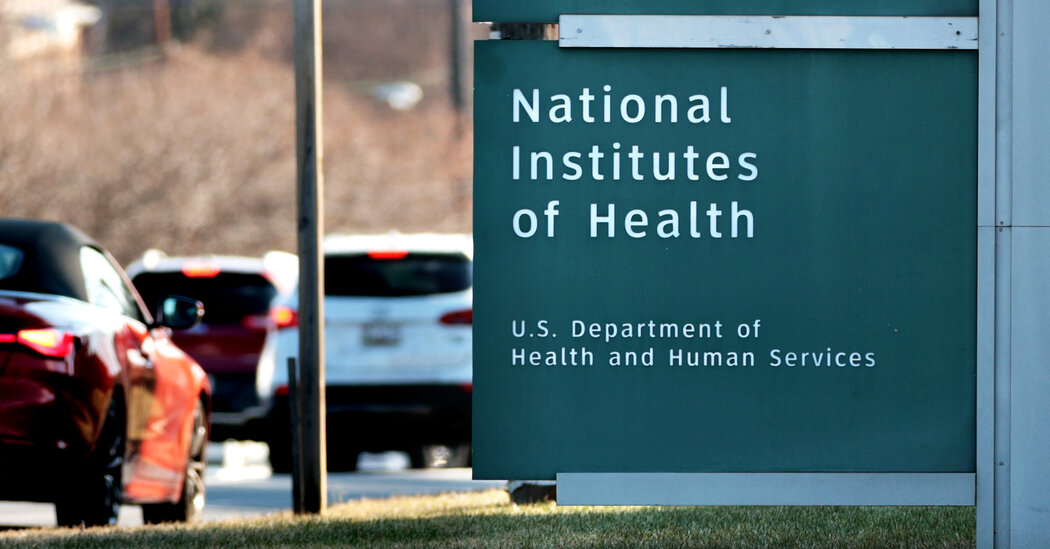Here is the result without the additional lines:
A week after Donald J. Trump was inaugurated, a senior scientist at the National Institutes of Health was preparing to give an invited talk at a scientific meeting when an urgent call came in from an administrative assistant. There is a total communications ban, the scientist was told, and you cannot give the speech.
As soon as the scientist got back to the office, another ban went into effect — one that prohibited researchers from submitting papers to journals for publication. Seven senior investigators working in different parts of the National Institutes of Health described rules put in place on orders from the Department of Government Efficiency that risk hampering and undermining American medical science. All spoke on the condition of anonymity because they feared for their jobs for speaking publicly.
Rules change seemingly from day to day. Can scientists order necessary supplies to do their research? Yes. No. Maybe. Can they travel? A 30-day ban was put in place on Feb. 26. What happens next? No one knows.
It really is quite chilling, one of the scientists said. They are controlling information, causing chaos, disrupting everyone, keeping us off-balance.
Whatever people are reading in newspapers, it’s 10 times worse, the scientist added.
The N.I.H. towers over the world’s medical research. It is where the human genetic code was deciphered, where hepatitis C was discovered, where the AIDS virus was isolated, where the first drug to treat AIDS was discovered and where basic research that helped lead to the Covid vaccines was done. It funded the work decades ago that led to the creation of Ozempic and other new drugs that cause weight loss.
It is very hard to cite seminal discoveries that were not in some way underwritten by the N.I.H., said Dr. Rudolph Leibel, a professor of medicine at Columbia University who, like most medical researchers in the United States, has received N.I.H. funding.
Dr. Francis Collins, a former director of the N.I.H., said, If you are taking something away from the scientists, you are undermining the way the N.I.H. functions.
We had to scramble and beg to get funds, the scientist said. A few days ago, nonemergency supply orders resumed. But, the scientist said, now there is a huge backlog. And the staff that handled orders has been decimated by firings, he added.
We’ve been told you’d better think weeks ahead about supplies and reagents, he said. Other scientists said they had been affected by inconsistent guidelines on purchasing.
They keep changing the rules, said the senior scientist who has spent decades at the N.I.H. Policies change so quickly and frequently that who knows.
A different N.I.H. senior scientist said a program he used to order supplies for his lab was closed for a month. Then it opened for a day or so. A few days later it shut down again, and it has stayed shut.
He needs mice with special genetic traits for his studies.
We can’t order mice, he said. As a result, he said, several years’ worth of work is in jeopardy.
Scientists were chilled by the disruptive firing and rehiring of employees.
The Friday before Presidents’ Day weekend in February, a senior physician scientist learned that about 20 technicians had been fired in an N.I.H. blood bank where patient samples are analyzed, part of an order that eliminated probationary workers who had been in their current position for less than two years. The order also led to the firing of probationary workers who prepare transfusions there.
Also on the list to be fired because they were probationary were the fellows who care for sick patients in the Clinical Center — the N.I.H.’s hospital devoted to clinical research on its Bethesda campus. They included the staff of the intensive care unit and members of the code blue team that responds when a patient has a cardiac arrest.
Supervisors were stunned. These patients were ill. Who is going to care for them?
We would literally have to airlift patients out, the senior physician scientist said.
The Clinical Center got a last-minute reprieve after the researchers panicked and protested. DOGE stopped the firing of the intensive care doctors and allowed the N.I.H. to rehire the fired laboratory technicians and blood bank workers.
It was just unbelievably stressful, the senior physician scientist said.
Other scientists are learning that no job is safe, even ones held by highly regarded people with seniority.
Tenured staff members at the N.I.H. can no longer take for granted the automatic renewal of their contracts, a senior scientist said. Now some scientists are being put on leave without pay when their contracts run out, and then they wait anxiously to learn if they still have a job.
The effects ripple beyond the N.I.H., affecting decisions about what sort of research projects by academic scientists can even be considered for funding.
The National Institute of Neurological Disorders and Strokes, on the N.I.H.’s Bethesda campus, had been planning to issue grants to academic scientists to study blood- and brain-scan markers of non-Alzheimer’s dementia and amyotrophic lateral sclerosis.
But evaluating these grant proposals requires specialized review at the neurological disorders institute. DOGE’s orders shifted the reviews to another office where reviewers would not have specific expertise.
The result, a senior scientist administrator said, is that we will not be able to run that kind of program. Instead, he said, we will have to do simpler things.
N.I.H. employees are anxious that they will soon face a mass firing or reduction in force.
No one seems to know who would be fired, what criteria would be used or when it would happen, said the senior scientist who spoke about the problem ordering supplies.
It’s the not knowing, the chaos that is torturing people, he said.
If they said, We are going to RIF administrative senior scientists or anyone over 65 or anyone whose rating was poor, it would be much less stressful, he said, using the acronym for reduction in force.
But this is like Russian roulette, he added. You don’t know what’s coming.
Source link




